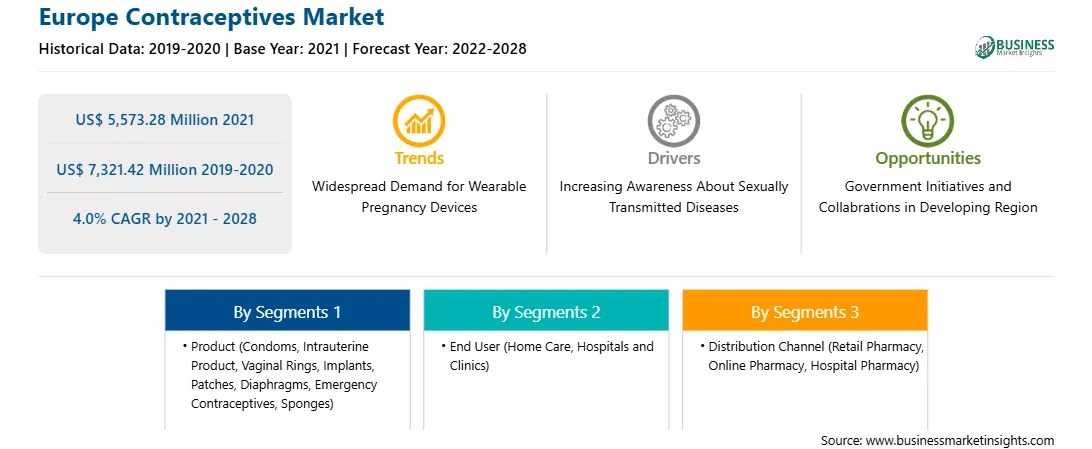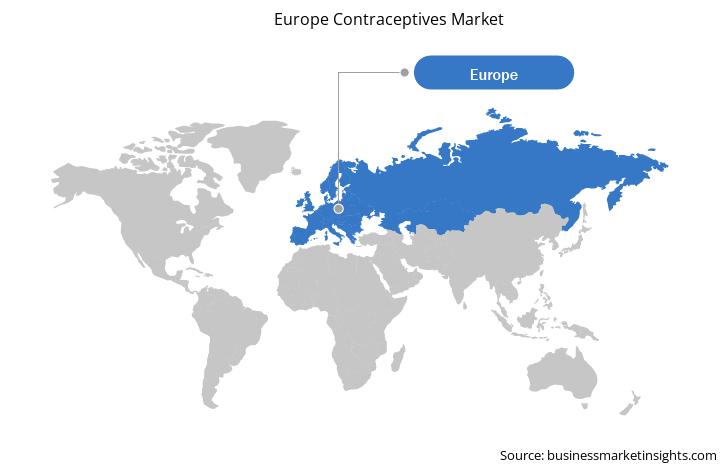The European market includes the consolidated markets for France, Germany, United Kingdom, Italy, Spain, and Rest of Europe. The market growth in the region is expected due to growing awareness among the population, increasing prevalence of sexually transmitted infections and government support for family planning. Growing support for family planning and reproductive health is likely to favor the market. Sex education is compulsory in German schools and a 1995 Federal Act ensures the right to information and advice on sex education, prevention, and family planning. The act establishes a Federal Center for Health Education and also funds the establishment of advisory centers. Pills and condoms are common contraceptives in Germany. Women below the age of 20 years are can obtain free contraceptives and medical consultations. Further, women above the age of 20 years can receive free IUDs. The German government committed EUR 514 million to family planning and reproductive health in 2017. This commitment is in line with Maternal Health Initiative, which focuses to provide information and access to modern contraceptives to around nine million couples. Surge in product innovations and launches is the major factor driving the growth of the Europe contraceptives market.
The high impact of the COVID-19 pandemic on reproductive health patients is high in terms of anxiety, fear, and psychological distress. Among all European countries, Spain, Italy, Germany, France, and the UK are most affected due to the increasing number of coronavirus cases and deaths associated with it. As per the Worldometer as of March 22, 2021, in Spain, Italy, Germany, France, UK and Netherlands, Belgium, and Luxembourg, the number of cases is 3,212,332, 3,376,376; 2,670,000; 4,282,603; 4,296,583; 1,201,545; 837,006; 59,416; respective and number of deaths are also high. WHO/Europe has assisted countries in developing an evidence-based approach to family planning and the introduction and adaption of WHO guidelines. This was done in collaboration with the United Nations Population Fund (UNFPA), the International Planned Parenthood Federation (IPPF), the European Network, the European Society of Contraception and Reproductive Health (ESC), the United States Agency for International Development (USAID) and other organizations. Lockdown took measures in Europe to respond to COVID-19 and imposed major disruptions to contraceptive supply chains. Moreover, according to BBC report of October, 2020, the sale of Durex jumped when social-distancing rules were relaxed in the summer, and also stated that, 2020 has been an extraordinary time for condom manufacturer and contraceptives business. The companies have seen, customers taking time to truly invest in their mental and sexual wellbeing. Therefore, in the long run the market has strong potential to boost the growth rate as Europe is the most populated region in the world and where a large number of condoms is being used in lockdown.

Strategic insights for the Europe Contraceptives provides data-driven analysis of the industry landscape, including current trends, key players, and regional nuances. These insights offer actionable recommendations, enabling readers to differentiate themselves from competitors by identifying untapped segments or developing unique value propositions. Leveraging data analytics, these insights help industry players anticipate the market shifts, whether investors, manufacturers, or other stakeholders. A future-oriented perspective is essential, helping stakeholders anticipate market shifts and position themselves for long-term success in this dynamic region. Ultimately, effective strategic insights empower readers to make informed decisions that drive profitability and achieve their business objectives within the market.

| Report Attribute | Details |
|---|---|
| Market size in 2021 | US$ 5,573.28 Million |
| Market Size by 2028 | US$ 7,321.42 Million |
| Global CAGR (2021 - 2028) | 4.0% |
| Historical Data | 2019-2020 |
| Forecast period | 2022-2028 |
| Segments Covered |
By Product
|
| Regions and Countries Covered | Europe
|
| Market leaders and key company profiles |
The geographic scope of the Europe Contraceptives refers to the specific areas in which a business operates and competes. Understanding local distinctions, such as diverse consumer preferences (e.g., demand for specific plug types or battery backup durations), varying economic conditions, and regulatory environments, is crucial for tailoring strategies to specific markets. Businesses can expand their reach by identifying underserved areas or adapting their offerings to meet local demands. A clear market focus allows for more effective resource allocation, targeted marketing campaigns, and better positioning against local competitors, ultimately driving growth in those targeted areas.

The contraceptives market in Europe is expected to grow from US$ 5,573.28 million in 2021 to US$ 7,321.42 million by 2028; it is estimated to grow at a CAGR of 4.0% from 2021 to 2028. Traditional contraceptives such as IUDs are invasive, and birth control pills may cause side effects such as high menstrual bleeding, acne, and hormonal imbalance. The demand for alternative options has led to the emergence of digital technological contraceptive solutions that allow women to plan family without harmful side effects. Many web-based applications are being launched frequently, which provide hormone-free family planning options. Contraception-focused smartphone apps use algorithms to track entered fertility signs over time, then alert users to avoid intercourse on their peak fertility days. In 2018, the Natural Cycles app received the FDA approval and became the first direct-to-consumer digital birth control app, to lead the way of non-hormonal and non-invasive birth control options. Natural Cycles’ approval is based on the study of more than 15,000 women and 180,000 cycles, and it claims a 93% success rate, the same as a contraceptive pill. On March 1, 2021, another digital birth control app—Clue—received an FDA clearance and to become the second contraceptive app. Pexxi, founded in 2018, offers a personalized oral contraception service by combining data from an online questionnaire and hormone test kits to predict the best pill for individual women. The company also offers monitoring services to help women to track the effects of the pill over time. In case of any side effects on health due to birth control pills, it can offer alternative suggestions. This is how digital fertility methods can be used for family planning.
The market for Europe contraceptives market is segmented into product, end user, and distribution channel, and country. Based on product, the market is segmented condoms, intrauterine product (IUDs), vaginal rings, implants, patches, diaphragms, emergency contraceptives, sponges, and others. The condoms segment dominated the market in 2020 and intrauterine product (IUDs) segment is expected to be the fastest growing during the forecast period. Further, the segment condoms has been bifurcated into female condoms and male condoms. Similarly, the intrauterine product (IUDs) is bifurcated into hormonal IUDs and copper IUDs. Based on end user, the market is segmented into home care, and hospitals and clinics. The home care segment dominated the market in 2020 and is expected to be the fastest growing during the forecast period. Based on distribution channel, the market is segmented into retail pharmacy, online pharmacy, and hospital pharmacy. The retail pharmacy segment dominated the market in 2020 and is expected to be the fastest growing during the forecast period.
A few major primary and secondary sources referred to for preparing this report on the contraceptives market in Europe are company websites, annual reports, financial reports, national government documents, and statistical database, among others. Major companies listed in the report are Bayer AG; Church & Dwight, Inc.; CooperSurgical (Cooper Companies, Inc.); HLL Lifecare Limited; and Merck & Co., Inc. among others.
The Europe Contraceptives Market is valued at US$ 5,573.28 Million in 2021, it is projected to reach US$ 7,321.42 Million by 2028.
As per our report Europe Contraceptives Market, the market size is valued at US$ 5,573.28 Million in 2021, projecting it to reach US$ 7,321.42 Million by 2028. This translates to a CAGR of approximately 4.0% during the forecast period.
The Europe Contraceptives Market report typically cover these key segments-
The historic period, base year, and forecast period can vary slightly depending on the specific market research report. However, for the Europe Contraceptives Market report:
The Europe Contraceptives Market is populated by several key players, each contributing to its growth and innovation. Some of the major players include:
The Europe Contraceptives Market report is valuable for diverse stakeholders, including:
Essentially, anyone involved in or considering involvement in the Europe Contraceptives Market value chain can benefit from the information contained in a comprehensive market report.